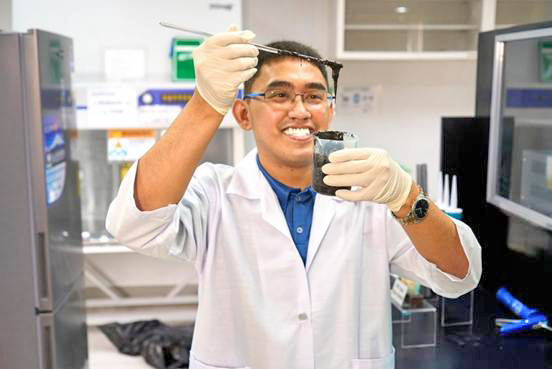Filipino inventor Mark Kennedy Bantugon, who developed a sustainable aircraft sealant and adhesive made from agricultural waste from Pili tree resin, is among the top 10 innovators for the European Patent Office’s (EPO) Young Inventors Prize 2025.
Bantugon is set to receive the award from the EPO in Iceland on June 18, 2025.
The aviation industry relies on sealants to prevent fuel leaks, but conventional options often contain toxic chemicals that can pose health risks and require hazardous waste treatment.
Bantugon, 26, has developed Pili Seal, a bio-based alternative derived from the agricultural waste of Pili tree resin. The material, an aircraft sealant and adhesive, aims to improve workplace safety in the aviation industry and reduce environmental impact by offering a locally sourced, biodegradable option.
Bantugon’s innovation has earned him a place as one of the ten global innovators in the Young Inventors Prize 2025, also known as Tomorrow Shapers. He was selected from 450 candidates by an independent jury.
For over 50 years, polysulfide-based sealants have been the industry standard for preventing fuel leaks in aircraft. However, they can cause skin and respiratory irritation, and their disposal poses an environmental challenge, especially when heated or burned. The European Chemicals Agency has identified substances commonly found in adhesives and sealants as hazardous, underscoring the need for careful handling and disposal.
Pili Seal offers a safer alternative to some toxic petrochemical-derived sealants and adhesives, utilizing a by-product of the perfume industry. The two-part sealant and adhesive combines the agricultural waste Pili tree resin with a solvent and hardening agent, providing both sealing and adhesive properties. It withstands fuel exposure, heat, and pressure, making it suitable for aircraft fuel tanks and other high-performance applications. The sealant has undergone thorough testing, with four formulations passing industry-standard flammability tests.
Beyond aviation, the invention has the potential for use in construction, automotive, marine, and defense industries, contributing to a circular economy by repurposing the estimated 155 million kilograms of agricultural Pili Tree resin waste generated annually in the Philippines, primarily from the perfume and food sectors.
Bantugon’s early exposure to farm life in Batangas province played a significant role in his innovation journey. As a child, he and his siblings patched leaky roofs using chewing gum, sparking his curiosity about adhesives and sealants. This interest continued into his aeronautical engineering studies, where an internship at Lufthansa Technik Philippines exposed him to the hazards of conventional sealants and adhesives.
Determined to develop a safer and more sustainable alternative, Bantugon experimented with resins from six different trees before selecting Pili tree resin. The resin’s natural stickiness offers ideal adhesive properties, while its fragrant odor makes it easier to work with, especially in confined spaces. Overcoming numerous challenges, he refined 84 different formulations before achieving the final composition. To commercialize his sealant, Bantugon founded Pili AdheSeal Inc. in 2024.
“My mother, a public-school teacher, helped me understand the value of a strong and well-rounded education. My father, as a farmer, introduced me to the farm as a training ground—a place where I learned about different plants, animals, trees, and, most importantly, the potential in waste materials,” Bantugon said.
The Young Inventors Prize celebrates worldwide innovators aged 30 and under who use technology to address global challenges outlined by the United Nations Sustainable Development Goals (SDGs). By transforming agricultural waste into a high-performance sealant, Bantugon is directly contributing to UN SDG 9 (Industry, Innovation & Infrastructure).
The prizes for the 2025 edition will be announced during a ceremony livestreamed from Iceland on June 18, 2025.








